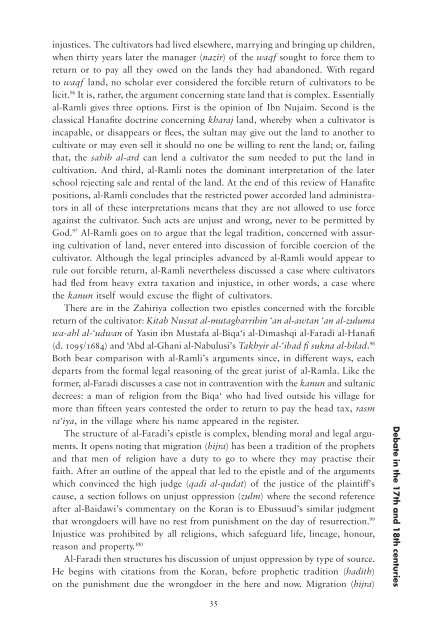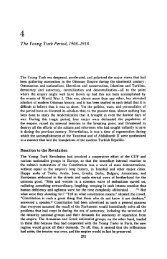Governing property, making the modern state - PSI424
Governing property, making the modern state - PSI424
Governing property, making the modern state - PSI424
Create successful ePaper yourself
Turn your PDF publications into a flip-book with our unique Google optimized e-Paper software.
injustices. The cultivators had lived elsewhere, marrying and bringing up children,<br />
when thirty years later <strong>the</strong> manager (nazir) of <strong>the</strong> waqf sought to force <strong>the</strong>m to<br />
return or to pay all <strong>the</strong>y owed on <strong>the</strong> lands <strong>the</strong>y had abandoned. With regard<br />
to waqf land, no scholar ever considered <strong>the</strong> forcible return of cultivators to be<br />
licit. 96 It is, ra<strong>the</strong>r, <strong>the</strong> argument concerning <strong>state</strong> land that is complex. Essentially<br />
al-Ramli gives three options. First is <strong>the</strong> opinion of Ibn Nujaim. Second is <strong>the</strong><br />
classical Hanafite doctrine concerning kharaj land, whereby when a cultivator is<br />
incapable, or disappears or flees, <strong>the</strong> sultan may give out <strong>the</strong> land to ano<strong>the</strong>r to<br />
cultivate or may even sell it should no one be willing to rent <strong>the</strong> land; or, failing<br />
that, <strong>the</strong> sahib al-ard can lend a cultivator <strong>the</strong> sum needed to put <strong>the</strong> land in<br />
cultivation. And third, al-Ramli notes <strong>the</strong> dominant interpretation of <strong>the</strong> later<br />
school rejecting sale and rental of <strong>the</strong> land. At <strong>the</strong> end of this review of Hanafite<br />
positions, al-Ramli concludes that <strong>the</strong> restricted power accorded land administrators<br />
in all of <strong>the</strong>se interpretations means that <strong>the</strong>y are not allowed to use force<br />
against <strong>the</strong> cultivator. Such acts are unjust and wrong, never to be permitted by<br />
God. 97 Al-Ramli goes on to argue that <strong>the</strong> legal tradition, concerned with assuring<br />
cultivation of land, never entered into discussion of forcible coercion of <strong>the</strong><br />
cultivator. Although <strong>the</strong> legal principles advanced by al-Ramli would appear to<br />
rule out forcible return, al-Ramli never<strong>the</strong>less discussed a case where cultivators<br />
had fled from heavy extra taxation and injustice, in o<strong>the</strong>r words, a case where<br />
<strong>the</strong> kanun itself would excuse <strong>the</strong> flight of cultivators.<br />
There are in <strong>the</strong> Zahiriya collection two epistles concerned with <strong>the</strong> forcible<br />
return of <strong>the</strong> cultivator: Kitab Nusrat al-mutagharribin ‘an al-awtan ‘an al-zuluma<br />
wa-ahl al-‘udwan of Yasin ibn Mustafa al-Biqa‘i al-Dimashqi al-Faradi al-Hanafi<br />
(d. 1095/1684) and ‘Abd al-Ghani al-Nabulusi’s Takhyir al-‘ibad fi sukna al-bilad. 98<br />
Both bear comparison with al-Ramli’s arguments since, in different ways, each<br />
departs from <strong>the</strong> formal legal reasoning of <strong>the</strong> great jurist of al-Ramla. Like <strong>the</strong><br />
former, al-Faradi discusses a case not in contravention with <strong>the</strong> kanun and sultanic<br />
decrees: a man of religion from <strong>the</strong> Biqa‘ who had lived outside his village for<br />
more than fifteen years contested <strong>the</strong> order to return to pay <strong>the</strong> head tax, rasm<br />
ra‘iya, in <strong>the</strong> village where his name appeared in <strong>the</strong> register.<br />
The structure of al-Faradi’s epistle is complex, blending moral and legal arguments.<br />
It opens noting that migration (hijra) has been a tradition of <strong>the</strong> prophets<br />
and that men of religion have a duty to go to where <strong>the</strong>y may practise <strong>the</strong>ir<br />
faith. After an outline of <strong>the</strong> appeal that led to <strong>the</strong> epistle and of <strong>the</strong> arguments<br />
which convinced <strong>the</strong> high judge (qadi al-qudat) of <strong>the</strong> justice of <strong>the</strong> plaintiff’s<br />
cause, a section follows on unjust oppression (zulm) where <strong>the</strong> second reference<br />
after al-Baidawi’s commentary on <strong>the</strong> Koran is to Ebussuud’s similar judgment<br />
that wrongdoers will have no rest from punishment on <strong>the</strong> day of resurrection. 99<br />
Injustice was prohibited by all religions, which safeguard life, lineage, honour,<br />
reason and <strong>property</strong>. 100<br />
Al-Faradi <strong>the</strong>n structures his discussion of unjust oppression by type of source.<br />
He begins with citations from <strong>the</strong> Koran, before prophetic tradition (hadith)<br />
on <strong>the</strong> punishment due <strong>the</strong> wrongdoer in <strong>the</strong> here and now. Migration (hijra)<br />
35<br />
Debate in <strong>the</strong> 17th and 18th centuries












